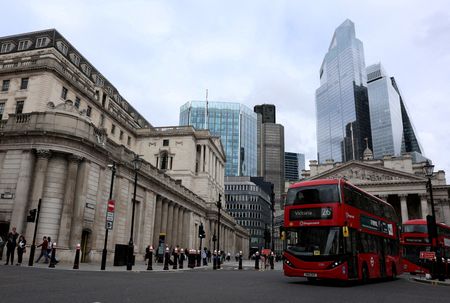By Yoruk Bahceli
LONDON (Reuters) -Britain’s government is likely to repeat tax rises next year after abandoning a plan to raise income tax last week, Franklin Templeton’s head of European fixed income said on Tuesday.
The move sent British borrowing costs sharply higher on Friday, with investors saying the news dented the government’s fiscal credibility.
Investors, who see hiking income tax as the most reliable way to close Britain’s fiscal shortfall and protect it finances against shocks, expect the government to try to raise a number of smaller taxes instead.
“I do think this is going to be repeated next year, I don’t think this is a one off,” David Zahn told reporters, adding he thought finance minister Rachel Reeves was unlikely to stay in her current role next year.
But raising taxes next year will be much harder as the government runs out of alternative measures, so an income tax increase could be back on the table next year, Zahn added.
Zahn said he is “not optimistic” on British government bonds, known as gilts, given the unpredictability of government policy.
Franklin Templeton manages around $1.5 trillion.
“They don’t have a plan of how they’re going to bring finances down,” he said, referring to Britain’s debt pile.
The biggest risk facing markets in next week’s budget is that Reeves disappoints, sending bond yields higher and forcing her to deliver a secondary budget, he added.
Thirty-year gilt yields, which are currently around 5.3%, could hit 6%, a level not seen since the late 1990’s, Zahn said. That’s a level beyond which Britain’s debt would be unsustainable, but it would also present a buying opportunity, he added.
(Reporting by Yoruk Bahceli; Writing by Amanda Cooper; Editing by Alun John and Dhara Ranasinghe)











